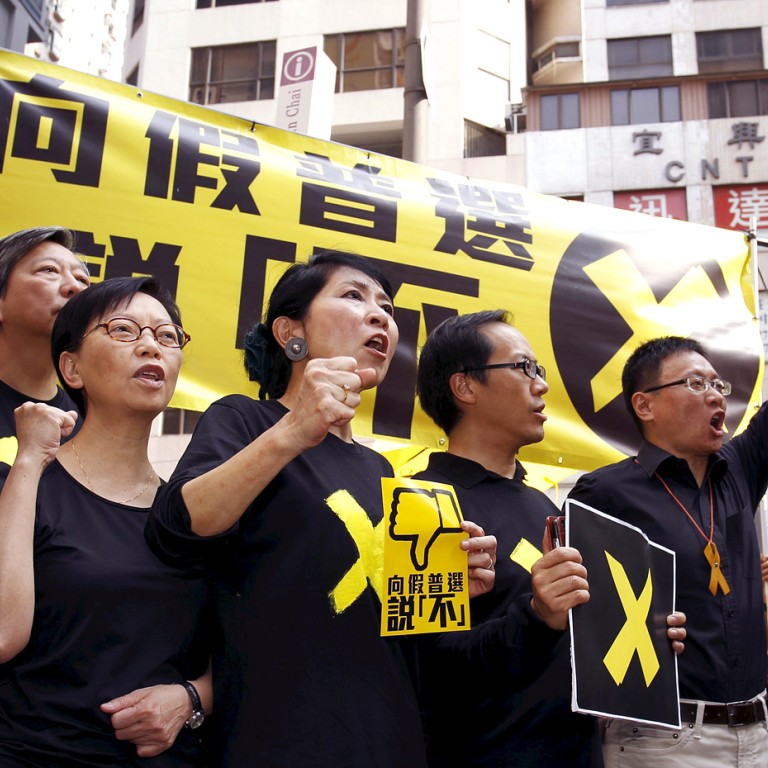
Hong Kong drifting to economic decline in battle over democracy
My article last week set off a raw nerve among some readers.
RTHK’s Backchat program found it sufficiently controversial to warrant a panel discussion on the topic. I presented empirical evidence by Harvard economist Robert Barro that showed political freedom and economic growth were positively correlated among countries with low levels of democracy (using political freedoms as a proxy indicator), but negatively correlated for those with high levels of democracy.
Barro illustrated this in an inverted U-shaped pattern based on data from 113 countries covering the period 1965-1990. He later extended the coverage up to 2010 using two data samples, one containing 89 countries and the other 151 countries. In all cases, he found the same inverted U-shaped pattern.
Barro’s diagram is in fact a partial correlation because it holds constant other factors known to be correlated to growth. But it is easy to misunderstand its implication. It does not show authoritarian governments are good or better for economic growth. It merely suggests democratization can both benefit and harm economic growth depending on how far democracy has matured in a society.
The evidence of non-linearity in the relationship implies this.
There is considerable evidence to suggest that authoritarian governments can achieve very high growth rates for a period of time. South Korea, Taiwan, Singapore, and China have all done so under authoritarian rule.
But the empirical evidence also shows that growth is very low and sometimes even negative in most authoritarian countries. The variation in economic growth rates among authoritarian countries is far greater compared to democratic ones.
This accords with common sense. It is the uncertainty of power succession among authoritarian governments that makes democracy a preferred political arrangement.
However, democracy has not stopped interest groups lobbying for privilege and protection. Lobbying activities in fact thrive under stable democracies.
The role of lobbyists featured in the work of economist Mancur Olson in the latter half of the last century, who was also influential in the study of the relationship between political democracy and economic growth.
Olson looked at how interest groups became successful at political lobbying. He then showed how the proliferation of organized narrow vested interests would lead over time to social rigidities, economic stagnation, and the decline of nations.
His thesis argues that successful interest groups overcome the “free rider” problem by providing benefits only to active participants, to the exclusion of others. As a result, these groups tend to serve narrow interests because it is less costly to organize a smaller group.
This thesis explains an entire host of phenomena, such as why trade everywhere remains fettered. Why do rich industrialized countries protect agriculture when farmers are a small fraction of the population, but poor agricultural countries tax and harm agricultural interests whose numbers are enormous? These are both outcomes of large interest groups failing to organize politically.
Barro’s inverted U-shaped diagram suggests mature democracies may experience something akin to the law of diminishing returns, while Olson’s thesis provides a mechanism for interpreting why this might happen – the accumulation of narrow special interest groups.
Hong Kong’s political system suffers from a combination of forces that gives inordinate political power to narrow vested interest groups. Some were inherited from the British colonial days and have been institutionalized in functional constituencies. Some are identified with the establishment and others with the pan-democrats.
The geographical constituencies based on proportional representation foster fragmentation. Hong Kong’s pan-democrat parties have fallen victim to these divisive forces and are drifting towards radical opportunism and political posturing without leadership.
The Chief Executive is a lone force, short on legitimacy, and caught in a hopeless trap of divided loyalty between Beijing and the people of Hong Kong.
In a little over a month, Hong Kong’s legislature will most likely choose to continue the status quo for at least another seven years. The Chief Executive will most likely simply wait to turn off the lights. This is not in the interest of the vast majority of the people of Hong Kong, but it is in the interest of many narrow organized interests in Hong Kong.
If this were to pass, it would be delusional to believe it is a step towards some better democracy. Economically, it is a step towards decline. Politically it is an invitation to tyranny. Is this what Beijing truly wishes to see happen in Hong Kong? I find it difficult to believe this is what the people of Hong Kong want.
Richard Wong Yue-chim is Philip Wong Kennedy Wong Professor in Political Economy at the University of Hong Kong

